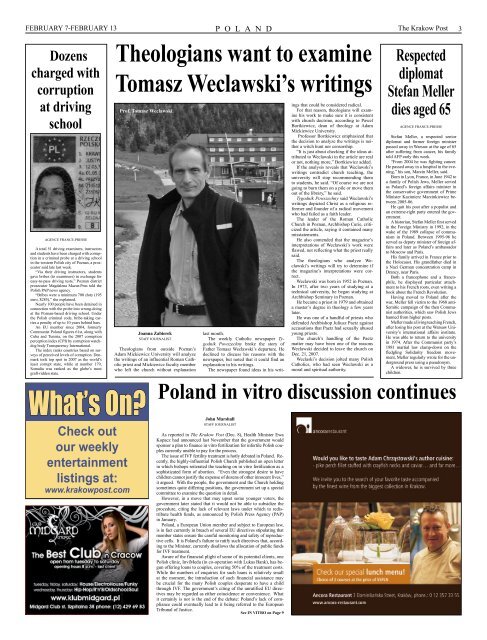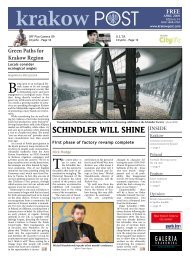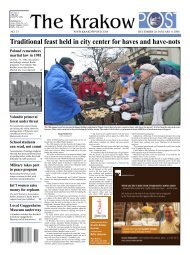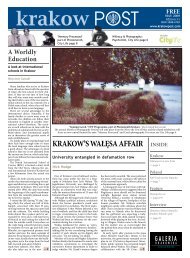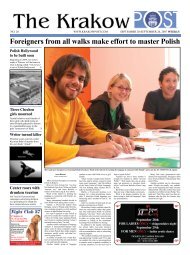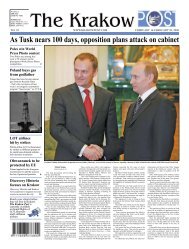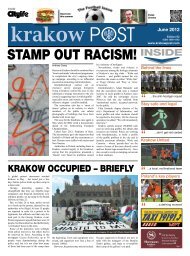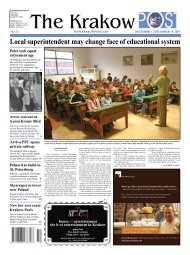Poland looks to Silesia for energy diversification - Krakow Post
Poland looks to Silesia for energy diversification - Krakow Post
Poland looks to Silesia for energy diversification - Krakow Post
Create successful ePaper yourself
Turn your PDF publications into a flip-book with our unique Google optimized e-Paper software.
FEBRUARY 7-FEBRUARY 13<br />
P O L A N D The <strong>Krakow</strong> <strong>Post</strong> 3<br />
Dozens<br />
charged with<br />
corruption<br />
at driving<br />
school<br />
agence france-presse<br />
A <strong>to</strong>tal 51 driving examiners, instruc<strong>to</strong>rs<br />
and students have been charged with corruption<br />
in a criminal probe at a driving school<br />
in the western Polish city of Poznan, a prosecu<strong>to</strong>r<br />
said late last week.<br />
“Via their driving instruc<strong>to</strong>rs, students<br />
gave bribes (<strong>to</strong> examiners) in exchange <strong>for</strong><br />
easy-<strong>to</strong>-pass driving tests,” Poznan district<br />
prosecu<strong>to</strong>r Magdalena Mazur-Prus <strong>to</strong>ld the<br />
Polish PAP news agency.<br />
“Bribes were a minimum 700 zloty (195<br />
euro, $285),” she explained.<br />
Nearly 100 people have been detained in<br />
connection with the probe in<strong>to</strong> wrong-doing<br />
at the Poznan-based driving school. Under<br />
the Polish criminal code, bribe-taking carries<br />
a penalty of up <strong>to</strong> 10 years behind bars.<br />
An EU member since 2004, <strong>for</strong>merly<br />
Communist <strong>Poland</strong> figures 61st, along with<br />
Cuba and Tunisia, on the 2007 corruption<br />
perception index (CPI) by corruption watchdog<br />
body Transparency International.<br />
The index ranks countries based on surveys<br />
of perceived levels of corruption. Denmark<br />
<strong>to</strong>ok <strong>to</strong>p spot in 2007 as the world’s<br />
least corrupt state, while at number 179,<br />
Somalia was ranked as the globe’s most<br />
graft-ridden state.<br />
Theologians want <strong>to</strong> examine<br />
Tomasz Weclawski’s writings<br />
Prof. Tomasz Weclawski.<br />
What’s On?<br />
Check out<br />
our weekly<br />
entertainment<br />
listings at:<br />
www.krakowpost.com<br />
Joanna Zabierek<br />
staff journalist<br />
Theologians from outside Poznan’s<br />
Adam Mickiewicz University will analyze<br />
the writings of an influential Roman Catholic<br />
priest and Mickiewicz faculty member<br />
who left the church without explanation<br />
John Marshall<br />
staff journalist<br />
As reported in The <strong>Krakow</strong> <strong>Post</strong> (Dec. 8), Health Minister Ewa<br />
Kopacz had announced last November that the government would<br />
sponsor a plan <strong>to</strong> finance in vitro fertilization <strong>for</strong> infertile Polish couples<br />
currently unable <strong>to</strong> pay <strong>for</strong> the process.<br />
The issue of IVF fertility treatment is hotly debated in <strong>Poland</strong>. Recently,<br />
the highly-influential Polish Church published an open letter<br />
in which bishops reiterated the teaching on in vitro fertilization as a<br />
sophisticated <strong>for</strong>m of abortion. “Even the strongest desire <strong>to</strong> have<br />
children cannot justify the expense of dozens of other innocent lives,”<br />
it argued. With the people, the government and the Church holding<br />
sometimes quite differing positions, the government set up a special<br />
committee <strong>to</strong> examine the question in detail.<br />
However, in a move that may upset some younger voters, the<br />
government later stated that it would not be able <strong>to</strong> subsidize the<br />
procedure, citing the lack of relevant laws under which <strong>to</strong> redistribute<br />
health funds, as announced by Polish Press Agency (PAP)<br />
in January.<br />
<strong>Poland</strong>, a European Union member and subject <strong>to</strong> European law,<br />
is in fact currently in breach of several EU directives stipulating that<br />
member states ensure the careful moni<strong>to</strong>ring and safety of reproductive<br />
cells. It is <strong>Poland</strong>’s failure <strong>to</strong> ratify such directives that, according<br />
<strong>to</strong> the Minister, currently disallows the allocation of public funds<br />
<strong>for</strong> IVF treatment.<br />
Aware of the financial plight of some of its potential clients, one<br />
Polish clinic, InviMedu (in co-operation with Lukas Bank), has begun<br />
offering loans <strong>to</strong> couples, covering 50% of the treatment costs.<br />
While the numbers of enquiries <strong>for</strong> such loans is relatively small<br />
at the moment, the introduction of such financial assistance may<br />
be crucial <strong>for</strong> the many Polish couples desperate <strong>to</strong> have a child<br />
through IVF. The government’s citing of the unratified EU directives<br />
may be regarded as either coincidence or convenience. What<br />
it certainly is not is the end of the debate: <strong>Poland</strong>’s lack of compliance<br />
could eventually lead <strong>to</strong> it being referred <strong>to</strong> the European<br />
Tribunal of Justice.<br />
See IN VITRO on Page 9<br />
last month.<br />
The weekly Catholic newspaper Tygodnik<br />
Powszechny broke the s<strong>to</strong>ry of<br />
Father Tomasz Weclawski’s departure. He<br />
declined <strong>to</strong> discuss his reasons with the<br />
newspaper, but noted that it could find an<br />
explanation in his writings.<br />
The newspaper found ideas in his writings<br />
that could be considered radical.<br />
For that reason, theologians will examine<br />
his work <strong>to</strong> make sure it is consistent<br />
with church doctrine, according <strong>to</strong> Pawel<br />
Bortkiewicz, dean of theology at Adam<br />
Mickiewicz University.<br />
Professor Bortkiewicz emphasized that<br />
the decision <strong>to</strong> analyze the writings is neither<br />
a witch hunt nor censorship.<br />
“It is just about checking if the ideas attributed<br />
<strong>to</strong> Weclawski in the article are real<br />
or not, nothing more,” Bortkiewicz added.<br />
If the analysis reveals that Weclawski’s<br />
writings contradict church teaching, the<br />
university will s<strong>to</strong>p recommending them<br />
<strong>to</strong> students, he said. “Of course we are not<br />
going <strong>to</strong> burn them on a pile or move them<br />
out of the library,” he said.<br />
Tygodnik Powszechny said Weclawski’s<br />
writings depicted Christ as a religious re<strong>for</strong>mer<br />
and founder of a radical movement<br />
who had failed as a faith leader.<br />
The leader of the Roman Catholic<br />
Church in Poznan, Archbishop Curie, criticized<br />
the article, saying it contained many<br />
misstatements.<br />
He also contended that the magazine’s<br />
interpretations of Weclawski’s work were<br />
flawed, not reflecting what the priest really<br />
said.<br />
The theologians who analyze Weclawski’s<br />
writings will try <strong>to</strong> determine if<br />
the magazine’s interpretations were correct.<br />
Weclawski was born in 1952 in Poznan.<br />
In 1973, after two years of studying at a<br />
technical university, he began studying at<br />
Archbishop Seminary in Poznan.<br />
He became a priest in 1979 and obtained<br />
a master’s degree in theology a few years<br />
later.<br />
He was one of a handful of priests who<br />
defended Archbishop Juliusz Paetz against<br />
accusations that Paetz had sexually abused<br />
young priests.<br />
The church’s handling of the Paetz<br />
matter may have been one of the reasons<br />
Weclawski decided <strong>to</strong> leave the church on<br />
Dec. 21, 2007.<br />
Weclaski’s decision jolted many Polish<br />
Catholics, who had seen Weclawski as a<br />
moral and spiritual authority.<br />
Respected<br />
diplomat<br />
Stefan Meller<br />
dies aged 65<br />
agence france-presse<br />
Stefan Meller, a respected senior<br />
diplomat and <strong>for</strong>mer <strong>for</strong>eign minister<br />
passed away in Warsaw at the age of 65<br />
after suffering from cancer, his family<br />
<strong>to</strong>ld AFP early this week.<br />
“From 2004 he was fighting cancer.<br />
He passed away in a hospital in the evening,”<br />
his son, Marcin Meller, said.<br />
Born in Lyon, France, in June 1942 <strong>to</strong><br />
a family of Polish Jews, Meller served<br />
as <strong>Poland</strong>’s <strong>for</strong>eign affairs minister in<br />
the conservative government of Prime<br />
Minister Kazimierz Marcinkiewicz between<br />
2005-06.<br />
He quit his post after a populist and<br />
an extreme-right party entered the government.<br />
A his<strong>to</strong>rian, Stefan Meller first served<br />
in the Foreign Ministry in 1992, in the<br />
wake of the 1989 collapse of communism<br />
in <strong>Poland</strong>. Between 1995-96 he<br />
served as deputy minister of <strong>for</strong>eign affairs<br />
and later as <strong>Poland</strong>’s ambassador<br />
<strong>to</strong> Moscow and Paris.<br />
His family arrived in France prior <strong>to</strong><br />
the Holocaust. His grandfather died in<br />
a Nazi German concentration camp in<br />
Drancy, near Paris.<br />
Both a francophone and a francophile,<br />
he displayed particular attachment<br />
<strong>to</strong> his French roots, even writing a<br />
book about the French Revolution.<br />
Having moved <strong>to</strong> <strong>Poland</strong> after the<br />
war, Meller fell victim <strong>to</strong> the 1968 anti-<br />
Semitic campaign of the then Communist<br />
authorities, which saw Polish Jews<br />
banned from higher posts.<br />
Meller made a living teaching French,<br />
after losing his post at the Warsaw University’s<br />
international affairs institute.<br />
He was able <strong>to</strong> return <strong>to</strong> the university<br />
in 1974. After the Communist party’s<br />
1981 martial law clamp-down on the<br />
fledgling Solidarity freedom movement,<br />
Meller regularly wrote <strong>for</strong> the underground<br />
press using a pseudonym.<br />
A widower, he is survived by three<br />
children.<br />
<strong>Poland</strong> in vitro discussion continues


